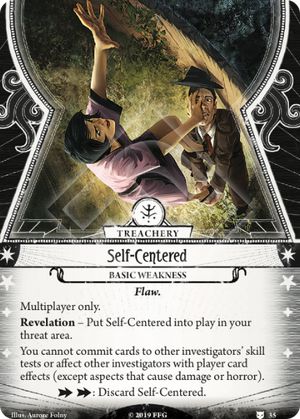Q: I'm trying to understand what Self-Centered does or doesn't affect. For instance does it prevent the usage of events or abilities that (1) target an asset of another player (2) modify the deck, hand, or discard of another player in some way (3) target drawn encounter cards, (4) target treacheries (5) constant abilities (6) Cards that may be assigned damage/horror from other investigators? Are the following still playable: Medical Texts, Stand Together, Crack the Case?
A: Self-Centered prevents you from “affecting” other investigators with player card effects, except for aspects that cause damage/horror. In general, when resolving player card effects, you can think of yourself as the only surviving investigator in the game; any other investigators are essentially immune to your player card effects, unless they would take damage/horror from those effects.
More specifically, if you have Self-Centered in your threat area, you can’t use player card effects to:
- heal damage/horror on another investigator
- redirect damage/horror that would be dealt to another investigator
- cancel, discard, or otherwise affect an encounter card another player draws
- manipulate cards in a player’s hand, deck, discard pile, play area, or threat area
- manipulate chaos tokens another investigator reveals
- “choose another investigator” or “choose an investigator” other than yourself
These general rules should cover most cases where Self-Centered’s ability would be relevant. This does change our last ruling on Self-Centered, but we are much happier with this direction, as it should be a lot easier to resolve most player cards.
Also:
- No, you can’t use the ability on Medical Texts to choose another investigator.
- No, you can’t play Stand Together to give just yourself the benefits.
Yes, you can play Crack the Case after any investigator discovers the last clue, but you must take all of the resources it provides.You would not be able to play Crack the Case when another investigator discovers the last clue on a location; you could only do so if you are the one to discover the last clue.- Other investigators would be able to use your Pocket Multi Tool, since that’s an ability they resolve themselves.
- If you use Cunning Distraction, then all enemies at the location would be evaded (exhausted and disengaged) because the card ability directly targets enemies, not other investigators. Also, you can fight an enemy engaged with a different investigator, so long as they aren’t using an ability that specifically targets “another investigator.”
(November 2023 / April 2024)
